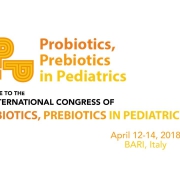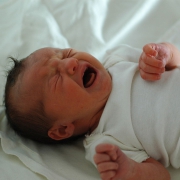ISAPP recognizes Prof. Michael Cabana’s contributions during his board of directors tenure
Prof. Michael Cabana’s service on ISAPP’s board of directors has come to an end in 2018—and the remaining board members wish to affirm his rich legacy of contributions, which furthered ISAPP’s mission of advancing the science of probiotics and prebiotics.
Dr. Cabana, Professor of Pediatrics, Epidemiology and Biostatistics and the Director of the Division of General Pediatrics at the University of California, San Francisco (UCSF), joined the ISAPP board in 2008. He served as secretary for five years and treasurer for one year, and was local host for the 2011 ISAPP annual meeting in Berkeley, USA. He chaired discussion groups at eight different annual meetings:
- 2009: Designing human clinical trials for probiotics
- 2010: Prebiotics and probiotics in perinatal nutrition
- 2012: From clinical trials to clinical guidelines: Reconciling the evidence
- 2013: Use of probiotics and/or prebiotics to program fetal and newborn health / first 1000 days of life
- 2014: Infant colic: Is there enough clinical evidence to support probiotic interventions?
- 2015: Technology transfer and academic-industry partnerships
- 2016: Colic update: IPDMA and mechanisms
- 2019: Prebiotic applications in children
Dr. Cabana was proactive in developing ISAPP responses to media misrepresentations of research by co-authoring letters to the editor in the New England Journal of Medicine (under review) and JAMA Internal Medicine (in press):
- Guarner F, Cabana MD, Sanders ME. Late initiation of probiotic therapy for acute pediatric gastroenteritis may account for null results. New England J Med. Submitted.
- Cabana MD, Salminen S, Sanders, ME. Probiotic safety – reasonable certainty of no harm. JAMA Internal Med. In Press.
As outcomes of ISAPP discussion groups or as part of other ISAPP initiatives, Dr. Cabana coauthored several papers, including:
- Sung V, D’Amico F, Cabana MD, Chau K, Koren G, Savino F, Szajewska H, Deshpande G, Dupont C, Indrio F, Mentula S, Partty A, Tancredi D. Lactobacillus reuteri DSM17938 to treat infant colic: a meta-analysis. 2018. Pediatrics. Jan;141(1). pii: e20171811. doi: 10.1542/peds.2017-1811.
- Sanders ME, Merenstein DJ, Ouwehand AC, Reid G, Salminen S, Cabana MD, Paraskevakos G, Leyer G. 2016. Probiotic Use in At-Risk Populations. J Amer Pharmacy Assoc. 56:680-686.
- Sung V, Cabana MD, D’Amico F, Deshpande G, Dupont C, Indrio F, Mentula S, Partty A, Savino F, Szajewska H, Tancredi D. 2014. Lactobacillus reuteri DSM17938 for managing infant colic: protocol for an individual participant data meta-analysis.BMJ Open:e006475. doi:10.1136/bmjopen-2014-006475, (Protocol also registered in PROSPERO database)
- Guarner F, Sanders ME, Gibson G, Klaenhammer T, Cabana M, Scott K, Reid G, Delzenne N, Fahey G, Hill C. 2011. Probiotic and prebiotic claims in Europe: seeking a clear roadmap. Br J Nutr. 106:1765-1767.
- Wallace TC, Guarner F, Madsen K, Cabana M, Gibson G, Hentges E, Sanders ME. 2011. Human Gut Microbiota and Their Relationship to Health and Disease. Nutrition Reviews 69:392-403.
- Shane AL, Cabana M, Vidry S, Merenstein D, Hummelen R, Ellis CL, Heimbach JT, Hempel S, Lynch S, Sanders ME, Tancredi DJ. 2010. Guide to designing, conducting, publishing, and communicating results of clinical studies involving probiotic applications in human participants. Gut Microbes 1:243-253.
- Lenoir-Wijnkoop I, Sanders, M.E., Van Loo, J., Rayes, N., Timmerman, H., Sherman, P. Cabana, M., Corthier, G., Charbonneau, D., Vaneechoutte, M., Caglar, E., Wolvers, D., Manneck, I. 2007. Probiotic and prebiotic influence beyond the intestinal tract. Nutr Rev. 65:469-489.
Always a congenial and collaborative colleague, Dr. Cabana will be missed by the ISAPP board as he now turns his focus to other professional activities. Dr. Cabana’s UCSF lab has several ongoing trials related to the microbiome and probiotics in pediatric populations.







